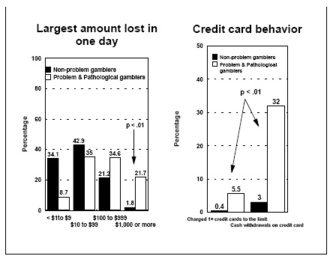New technology allows industries, including the gambling industry, to attract additional customers and retain old customers in innovative ways. Casino operators are providing more opportunities for ATM and credit card advances. They are installing more point of sale debit terminals on the casino floor, and building cashless money systems directly into slot machines1. Currently, one cashless money system involves a player card with which gamblers can wager by swiping it through a magnetic card reader on the gambling machine. A similar concept is a multifacility private label casino card. With this card, a player can open an account at a specific casino and use it instead of money at various gaming activities, restaurants, or shows. Casinos are considering sending promotional cards to potential customers with dollar values already on them. Another system planned for early next year would allow a player to transfer funds from a checking account directly to credit on the machine. In addition, cash dispensing equipment manufacturers have developed a way for a customer to bypass the $300-a-day limit on an ATM card. New machines also will allow customers to access their credit cards without a PIN number. While these new technologies* provide advantages to casino operators, the disadvantages to problem gamblers are yet to be established. In a recent study by Volberg**, problem and pathological gamblers lost significantly more in a single day, charged one or more credit cards to the limit, and took out cash withdrawals on credit cards significantly more than non-problem gamblers. Since access to the object of addiction plays a central role in behavior, future research will need to examine the specific risk factors associated with cashless systems. This technology may influence the prevalence of problem gambling as well as the severity of adverse consequences for problem gamblers.
Sources adapted from:
*Parets, R.T. (1996, December). Cash is no longer king. International Gaming & Wagering Business, 17(12), 64-65.
**Volberg, R. (1996). Gambling and problem gambling in New York: A 10-year replication survey, 1986-1996. Report to the New York Council on Problem Gambling.
This public education project is funded, in part, by The Andrews Foundation.





